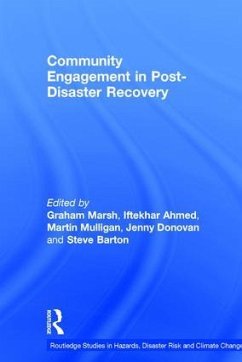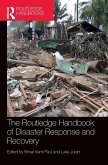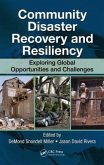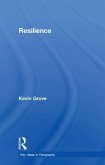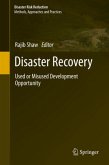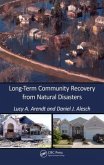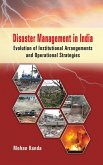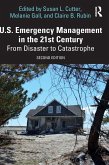Community Engagement in Post-Disaster Recovery
Herausgeber: Marsh, Graham; Barton, Steve; Donovan, Jenny; Mulligan, Martin; Ahmed, Iftekhar
Community Engagement in Post-Disaster Recovery
Herausgeber: Marsh, Graham; Barton, Steve; Donovan, Jenny; Mulligan, Martin; Ahmed, Iftekhar
- Gebundenes Buch
- Merkliste
- Auf die Merkliste
- Bewerten Bewerten
- Teilen
- Produkt teilen
- Produkterinnerung
- Produkterinnerung
The book explores the ways of working with communities in transition or trauma and particularly in their recovery phases in the array of case studies of practical experience, so that the book as a whole can offer practical suggestions on how to give more substance to the rhetoric of community consultation and engagement in these areas of work. It suggests a need to work with a dynamic understanding of community formation that is particularly relevant when people experience unforeseen challenges and traumatic experiences.
Andere Kunden interessierten sich auch für
![The Routledge Handbook of Disaster Response and Recovery The Routledge Handbook of Disaster Response and Recovery]() The Routledge Handbook of Disaster Response and Recovery287,99 €
The Routledge Handbook of Disaster Response and Recovery287,99 €![Community Disaster Recovery and Resiliency Community Disaster Recovery and Resiliency]() Community Disaster Recovery and Resiliency174,99 €
Community Disaster Recovery and Resiliency174,99 €![Resilience Resilience]() Kevin GroveResilience180,99 €
Kevin GroveResilience180,99 €![Disaster Recovery Disaster Recovery]() Disaster Recovery112,99 €
Disaster Recovery112,99 €![Long-Term Community Recovery from Natural Disasters Long-Term Community Recovery from Natural Disasters]() Lucy A ArendtLong-Term Community Recovery from Natural Disasters180,99 €
Lucy A ArendtLong-Term Community Recovery from Natural Disasters180,99 €![Disaster Management in India Disaster Management in India]() Mohan KandaDisaster Management in India52,99 €
Mohan KandaDisaster Management in India52,99 €![U.S. Emergency Management in the 21st Century U.S. Emergency Management in the 21st Century]() U.S. Emergency Management in the 21st Century190,99 €
U.S. Emergency Management in the 21st Century190,99 €-
-
-
The book explores the ways of working with communities in transition or trauma and particularly in their recovery phases in the array of case studies of practical experience, so that the book as a whole can offer practical suggestions on how to give more substance to the rhetoric of community consultation and engagement in these areas of work. It suggests a need to work with a dynamic understanding of community formation that is particularly relevant when people experience unforeseen challenges and traumatic experiences.
Produktdetails
- Produktdetails
- Verlag: Taylor & Francis
- Seitenzahl: 220
- Erscheinungstermin: 13. September 2017
- Englisch
- Abmessung: 234mm x 156mm x 14mm
- Gewicht: 517g
- ISBN-13: 9781138691650
- ISBN-10: 1138691658
- Artikelnr.: 57050415
- Herstellerkennzeichnung
- Libri GmbH
- Europaallee 1
- 36244 Bad Hersfeld
- gpsr@libri.de
- Verlag: Taylor & Francis
- Seitenzahl: 220
- Erscheinungstermin: 13. September 2017
- Englisch
- Abmessung: 234mm x 156mm x 14mm
- Gewicht: 517g
- ISBN-13: 9781138691650
- ISBN-10: 1138691658
- Artikelnr.: 57050415
- Herstellerkennzeichnung
- Libri GmbH
- Europaallee 1
- 36244 Bad Hersfeld
- gpsr@libri.de
Graham Marsh is a Visiting Research Fellow in Disaster Management at the School of Energy, Construction and Environment, Faculty of Engineering, Environment and Computing at Coventry University, UK. Iftekhar Ahmed is a Senior Lecturer in the School of Architecture and Built Environment, University of Newcastle, Australia. Martin Mulligan is an Associate Professor in the Sustainability and Urban Planning section of the School of Global, Urban and Social Studies at RMIT University and a former Director of RMIT's Globalism Research Centre, Australia. Jenny Donovan is the Principal of Melbourne-based urban design practice Inclusive Design, Australia. Steve Barton is a humanitarian training facilitator and freelance consultant working for agencies such as the Red Cross and the UN and is also founder and director of the Recovery Resource Centre.
List of figures
List of tables
Notes on contributors
Foreword by Professor John Twigg
Preface Graham Marsh, Iftekhar Ahmed, Martin Mulligan, Jenny Donovan and
Steve Barton
1. Rethinking the meaning of 'community' in community-based disaster
management - Martin Mulligan
2. Rebuilding lessons from bushfire-affected communities in Victoria,
Australia - Greg Ireton and Iftekhar Ahmed
3. A partnership-based community engagement approach to recovery of
flood-affected communities in Bangladesh - Iftekhar Ahmed
4. Public engagements in forward looking recovery efforts following the
2013 floods in High River and Calgary, Canada - Eva Bogdan, Amber
Bennett and Lilia Yumagulova
5. How the Chinese government responded to the Wenchuan earthquake -
Yung-Fang Chen
6. Participation for disaster resilience: A life cycle approach to
reconstruction projects in India - Mittul Vahanvati
7. A duty of care: Disaster recovery, community and social
responsibility in Indonesia - David O'Brien, Catherine Elliott and
Brendon McNiven
8. The role of community engagement in post-disaster reconstruction: The
cases of L'Aquila and Emilia Romagna, Italy - Lorenza Lazzati
9. Facts on the ground: Affirming community identity through placemaking
projects in West Bank villages - Jenny Donovan
10. Women and their roles in peace building in conflict vulnerable areas
of Mindanao, Philippines - Beau B. Beza, Mary Johnson and Anne
Shangrila Y. Fuentes
11. Community and conflict: The case of Rwanda - Marion E. MacLellan
12. Beneficiary Driven Recovery (BDR): An example from the Solomon
Islands - Steve Barton
13. From short-term relief to the revival of community in post-tsunami
Sri Lanka and India - Martin Mulligan
14. Community Recovery and the role of emergent organizations in
post-disaster home buyouts: A case study of Oakwood Beach, New York,
United States of America - Alex Greer and Sherri Brokopp Binder
15. Conclusions: Emerging lessons on community engagement in post-disaster
recovery Graham Marsh, Iftekhar Ahmed, Martin Mulligan, Jenny Donovan and
Steve Barton
Index
List of tables
Notes on contributors
Foreword by Professor John Twigg
Preface Graham Marsh, Iftekhar Ahmed, Martin Mulligan, Jenny Donovan and
Steve Barton
1. Rethinking the meaning of 'community' in community-based disaster
management - Martin Mulligan
2. Rebuilding lessons from bushfire-affected communities in Victoria,
Australia - Greg Ireton and Iftekhar Ahmed
3. A partnership-based community engagement approach to recovery of
flood-affected communities in Bangladesh - Iftekhar Ahmed
4. Public engagements in forward looking recovery efforts following the
2013 floods in High River and Calgary, Canada - Eva Bogdan, Amber
Bennett and Lilia Yumagulova
5. How the Chinese government responded to the Wenchuan earthquake -
Yung-Fang Chen
6. Participation for disaster resilience: A life cycle approach to
reconstruction projects in India - Mittul Vahanvati
7. A duty of care: Disaster recovery, community and social
responsibility in Indonesia - David O'Brien, Catherine Elliott and
Brendon McNiven
8. The role of community engagement in post-disaster reconstruction: The
cases of L'Aquila and Emilia Romagna, Italy - Lorenza Lazzati
9. Facts on the ground: Affirming community identity through placemaking
projects in West Bank villages - Jenny Donovan
10. Women and their roles in peace building in conflict vulnerable areas
of Mindanao, Philippines - Beau B. Beza, Mary Johnson and Anne
Shangrila Y. Fuentes
11. Community and conflict: The case of Rwanda - Marion E. MacLellan
12. Beneficiary Driven Recovery (BDR): An example from the Solomon
Islands - Steve Barton
13. From short-term relief to the revival of community in post-tsunami
Sri Lanka and India - Martin Mulligan
14. Community Recovery and the role of emergent organizations in
post-disaster home buyouts: A case study of Oakwood Beach, New York,
United States of America - Alex Greer and Sherri Brokopp Binder
15. Conclusions: Emerging lessons on community engagement in post-disaster
recovery Graham Marsh, Iftekhar Ahmed, Martin Mulligan, Jenny Donovan and
Steve Barton
Index
List of figures
List of tables
Notes on contributors
Foreword by Professor John Twigg
Preface Graham Marsh, Iftekhar Ahmed, Martin Mulligan, Jenny Donovan and
Steve Barton
1. Rethinking the meaning of 'community' in community-based disaster
management - Martin Mulligan
2. Rebuilding lessons from bushfire-affected communities in Victoria,
Australia - Greg Ireton and Iftekhar Ahmed
3. A partnership-based community engagement approach to recovery of
flood-affected communities in Bangladesh - Iftekhar Ahmed
4. Public engagements in forward looking recovery efforts following the
2013 floods in High River and Calgary, Canada - Eva Bogdan, Amber
Bennett and Lilia Yumagulova
5. How the Chinese government responded to the Wenchuan earthquake -
Yung-Fang Chen
6. Participation for disaster resilience: A life cycle approach to
reconstruction projects in India - Mittul Vahanvati
7. A duty of care: Disaster recovery, community and social
responsibility in Indonesia - David O'Brien, Catherine Elliott and
Brendon McNiven
8. The role of community engagement in post-disaster reconstruction: The
cases of L'Aquila and Emilia Romagna, Italy - Lorenza Lazzati
9. Facts on the ground: Affirming community identity through placemaking
projects in West Bank villages - Jenny Donovan
10. Women and their roles in peace building in conflict vulnerable areas
of Mindanao, Philippines - Beau B. Beza, Mary Johnson and Anne
Shangrila Y. Fuentes
11. Community and conflict: The case of Rwanda - Marion E. MacLellan
12. Beneficiary Driven Recovery (BDR): An example from the Solomon
Islands - Steve Barton
13. From short-term relief to the revival of community in post-tsunami
Sri Lanka and India - Martin Mulligan
14. Community Recovery and the role of emergent organizations in
post-disaster home buyouts: A case study of Oakwood Beach, New York,
United States of America - Alex Greer and Sherri Brokopp Binder
15. Conclusions: Emerging lessons on community engagement in post-disaster
recovery Graham Marsh, Iftekhar Ahmed, Martin Mulligan, Jenny Donovan and
Steve Barton
Index
List of tables
Notes on contributors
Foreword by Professor John Twigg
Preface Graham Marsh, Iftekhar Ahmed, Martin Mulligan, Jenny Donovan and
Steve Barton
1. Rethinking the meaning of 'community' in community-based disaster
management - Martin Mulligan
2. Rebuilding lessons from bushfire-affected communities in Victoria,
Australia - Greg Ireton and Iftekhar Ahmed
3. A partnership-based community engagement approach to recovery of
flood-affected communities in Bangladesh - Iftekhar Ahmed
4. Public engagements in forward looking recovery efforts following the
2013 floods in High River and Calgary, Canada - Eva Bogdan, Amber
Bennett and Lilia Yumagulova
5. How the Chinese government responded to the Wenchuan earthquake -
Yung-Fang Chen
6. Participation for disaster resilience: A life cycle approach to
reconstruction projects in India - Mittul Vahanvati
7. A duty of care: Disaster recovery, community and social
responsibility in Indonesia - David O'Brien, Catherine Elliott and
Brendon McNiven
8. The role of community engagement in post-disaster reconstruction: The
cases of L'Aquila and Emilia Romagna, Italy - Lorenza Lazzati
9. Facts on the ground: Affirming community identity through placemaking
projects in West Bank villages - Jenny Donovan
10. Women and their roles in peace building in conflict vulnerable areas
of Mindanao, Philippines - Beau B. Beza, Mary Johnson and Anne
Shangrila Y. Fuentes
11. Community and conflict: The case of Rwanda - Marion E. MacLellan
12. Beneficiary Driven Recovery (BDR): An example from the Solomon
Islands - Steve Barton
13. From short-term relief to the revival of community in post-tsunami
Sri Lanka and India - Martin Mulligan
14. Community Recovery and the role of emergent organizations in
post-disaster home buyouts: A case study of Oakwood Beach, New York,
United States of America - Alex Greer and Sherri Brokopp Binder
15. Conclusions: Emerging lessons on community engagement in post-disaster
recovery Graham Marsh, Iftekhar Ahmed, Martin Mulligan, Jenny Donovan and
Steve Barton
Index

